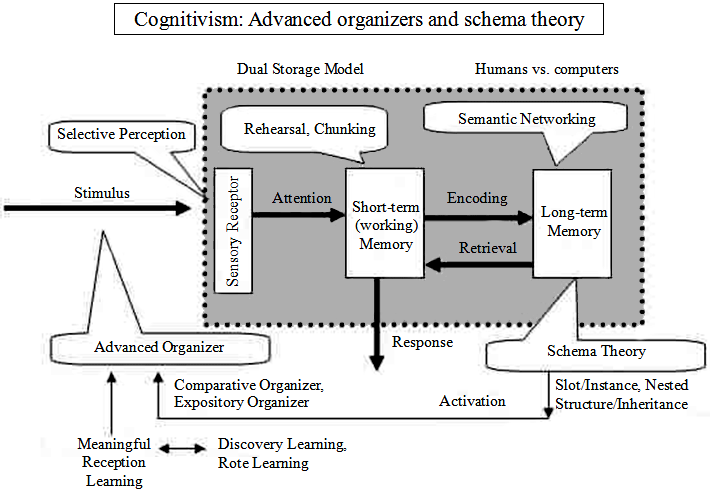Session 8 Three Major Trends of Learning Psychology (2):
Cognitivism: Advanced organizers and schema theory
- Introduction-
Cognitive psychology focused on how input information is processed, accumulated and retrieved in human brain, while behaviorist psychology focused only on the behavior by regarding the human brain as a black box. In other words, since modeling was pursued based on a human's process of information processing (which is called cognition), this camp was called cognitivism. Only recently has research of brain physiology enabled us to understand the relation between areas of the human brain and human behavior by investigating changes in the electrical potential of synapses. Conversely, cognitive psychology was the result of the work where researchers have repeated experiments and modeled human information processing (or, guessed it based on indirect evidence) without using a scalpel.

Cognitive psychology was combined with computer science so that "cognitive science" was born. Researchers of both sciences probably thought that they could develop their own research areas further by comparing information processing of human brains with that of computers. In fact, neurocomputers modeled on human cranial nerves are currently being studied. Other than memory and learning, cognitive science has a wide range of research topics, which include attention and consciousness, language, affect, vision, audition and movement. Lately, research on android and cranial nerves has drawn considerable attention as a popular issue.Cognitive psychology was combined with computer science so that "cognitive science" was born. Researchers of both sciences probably thought that they could develop their own research areas further by comparing information processing of human brains with that of computers. In fact, neurocomputers modeled on human cranial nerves are currently being studied. Other than memory and learning, cognitive science has a wide range of research topics, which include attention and consciousness, language, affect, vision, audition and movement. Lately, research on android and cranial nerves has drawn considerable attention as a popular issue.
Next, when learning is discussed from the viewpoint of cognitive psychology, learning is often conceptualized or modeled on the analogy of computers. There are, for example, comparisons of short-term memory to a CPU (of which content is deleted when the power is turned off), that of long-term memory to a hard disk or other external memory devices (things learned so far are stored according to a certain rule, but they cannot necessarily be retrieved), and others. Atkinson and Shiffrin proposed the Dual Storage Model by dividing human memory into Short-term memory and Long-term memory (Dual Storage Model: Atkinson and Shiffrin, 1971). The idea became the basis for nine events of instruction (events to support learning activities) proposed by Gagné, who gave birth to instructional design.
There are other forms of information processing unique to humans, which are not seen in computers, including Selective Perception (selecting subjectively information for processing with other information left unprocessed; we would be in trouble should computers adopt selective perception), Rehearsal (retaining information in the memory by keeping in mind that the information should be repeatedly memorized), Semantic Network (linking pieces of information semantically). Needless to say, such "uniqueness" may not exist indefinitely, if people try to make computers capable of information processing just like humans.